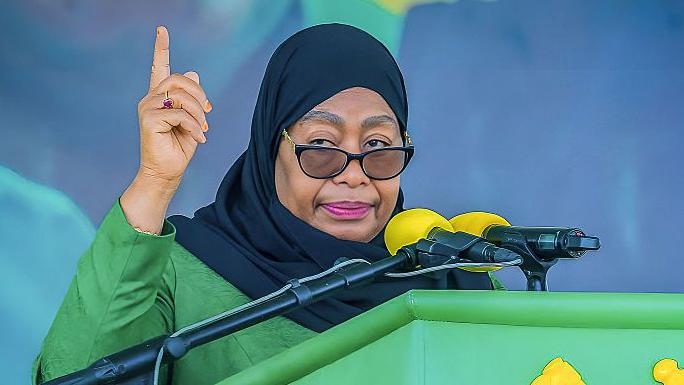Tanzania’s President Samia Suluhu sworn In for second term amid protests, violence, and internet blackout

Tanzania
Tanzanian President Samia Suluhu Hassan has been sworn in for a second term following a highly contested election overshadowed by allegations of fraud, widespread violence, and a nationwide internet shutdown.
The ceremony took place on Monday at a military parade ground in the capital, Dodoma, under tight security and without public attendance. State television broadcast the event live, marking a departure from previous open-air inaugurations.
Suluhu was declared the winner of the October 29 election with 98% of the vote, according to official results released by the national electoral commission. Opposition parties rejected the outcome, describing the election as neither free nor fair. Many opposition leaders were imprisoned, disqualified, or otherwise prevented from contesting.
Regional observers from the Southern African Development Community (SADC) expressed concern about the integrity of the process, noting that “voters could not express their democratic will” in several regions. They cited reports of ballot stuffing, intimidation, and restrictions on opposition activity.
The election period was marred by deadly protests and reports of excessive use of force by security personnel. Opposition groups and civil society organizations have claimed that hundreds of people were killed, while the government has not released official figures. Independent verification remains difficult due to the information blackout that began on election day and continued for several days afterward.
Amnesty International and other rights groups criticized the government’s decision to impose internet restrictions and electricity blackouts, saying the move silenced dissenting voices and made it harder to document alleged human rights violations. The organization also called for an independent investigation into reports of extrajudicial killings and mass arrests.
During her inauguration speech, President Suluhu thanked the electoral commission for conducting what she called an “efficient and transparent process” but expressed regret over the violence that marred the vote. “The loss of lives and destruction of property is a blot on our national image,” she said, promising to restore calm and ensure that “people’s lives return to normal.”
International leaders, including the presidents of Somalia, Mozambique, Zambia, and Burundi, attended the ceremony, while global figures such as UN Secretary-General António Guterres and EU foreign policy chief Kaja Kallas urged restraint and respect for human rights.
Opposition party Chadema, which was barred from the election, said it had documented “no fewer than 800 deaths” linked to the protests, while other diplomatic sources estimated at least 500 fatalities. The United Nations human rights office confirmed receiving credible reports of multiple deaths and injuries.
In many cities, public transportation, schools, and businesses have remained shut amid ongoing security operations. Some families reported missing relatives, with residents telling international media outlets that they had been unable to reach loved ones since election day.
This election was widely seen as a test of President Suluhu’s leadership. When she took office in 2021 following the death of former president John Magufuli, she was celebrated as Tanzania’s first female leader and initially adopted a more moderate tone. She lifted restrictions on political rallies and pledged democratic reforms.
However, critics now argue that her administration has become increasingly authoritarian. The main opposition leader, Tundu Lissu, remains in detention on treason charges he denies. His lawyer, Robert Amsterdam, accused the government of suppressing political freedoms and “using violence to eliminate opposition.”
Despite calls for a rerun from opposition parties, the government has maintained that the election was legitimate. The ruling Chama Cha Mapinduzi (CCM) party, which has governed Tanzania since independence, remains firmly in control.
As the country grapples with economic disruptions and lingering unrest, many Tanzanians are left questioning whether their hopes for democratic reform have faded under Suluhu’s renewed leadership.
FAQ
Q1: Who is Samia Suluhu Hassan?
Samia Suluhu Hassan is Tanzania’s first female president. She first assumed office in 2021 after the death of former President John Magufuli and was re-elected in 2025.
Q2: Why is the election result controversial?
The opposition claims the election was marred by intimidation, ballot stuffing, and restrictions that prevented fair competition. Most major opposition figures were barred from contesting.
Q3: How many people were killed in post-election violence?
Exact numbers remain unverified. Opposition groups claim hundreds were killed, while rights organizations have called for independent investigations.
Q4: Why was the internet shut down?
Authorities imposed nationwide internet restrictions on election day, citing security concerns. Rights groups said the blackout prevented citizens from sharing information and documenting abuses.
Q5: What are international observers saying?
Regional and international observers, including SADC and Amnesty International, have criticized the election process and urged Tanzania to restore civil rights and media freedom

